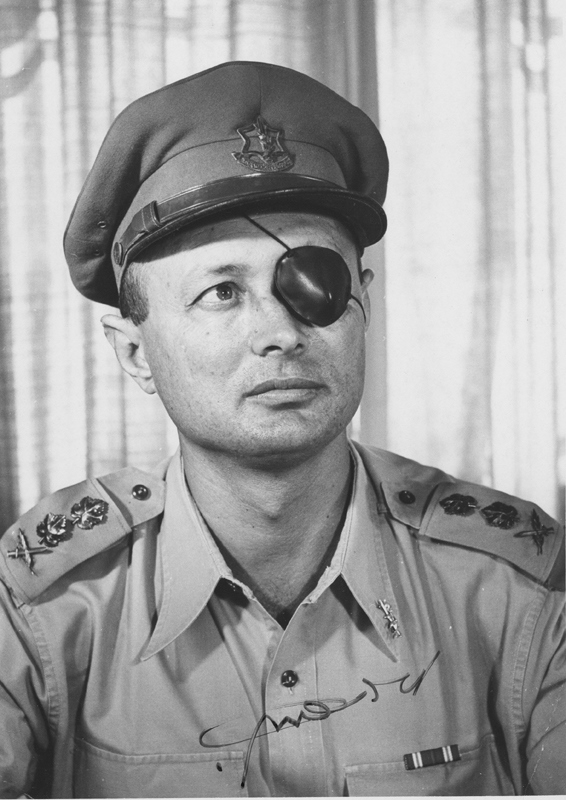This has been reported to be a direct quotation of Dayan in the diaries of Moshe Sharett, but is actually derived from an interpretive commentary by Livia Rokach in "Israel's Sacred Terrorism" (1980) upon statements of Dayan reported in Sharett's diaries, from accounts provided to him by Ya'acob Herzog and Gideon Raphael — in other words, it is a third-hand interpretation of Dayan's meaning, based on a second hand report of his arguments. Sharett's summation of Dayan's statements of 26 May 1955 read: We do not need a security pact with the U.S.: such a pact will only constitute an obstacle for us. We face no danger at all of an Arab advantage of force for the next 8-10 years. Even if they receive massive military aid from the West, we shall maintain our military superiority thanks to our infinitely greater capacity to assimilate new armaments. The security pact will only handcuff us and deny us the freedom of action which we need in the coming years. Reprisal actions which we couldn't carry out if we were tied to a security pact are our vital lymph ... they make it possible for us to maintain a high level of tension among our population and in the army. Without these actions we would have ceased to be a combative people and without the discipline of a combative people we are lost. We have to cry out that the Negev is in danger, so that young men will go there.... Rokach's interpretive assessment of this diary entry by Sharett produces: The conclusions from Dayan's words are clear: This State has no international obligations, no economic problems, the question of peace is nonexistent... It must calculate its steps narrow-mindedly and live on its sword. It must see the sword as the main, if not the only, instrument with which to keep its morale high and to retain its moral tension. Toward this end it may, no — it must — invent dangers, and to do this it must adopt the method of provocation-and-revenge.. . . And above all — let us hope for a new war with the Arab countries, so that we may finally get rid of our troubles and acquire our space.
Ref: en.wikiquote.org - Moshe Dayan / Misattributed
The Iron Wall (1999)
Mosze Dajan: Cytaty po angielsku
“If you want to make peace, you don't talk to your friends. You talk to your enemies.”
As quoted in Newsweek (17 October 1977)
As quoted in Warrior : The Autobiography of Ariel Sharon (1989)
While trying to work out a plan to internally destabilize Lebanon in favor of a Christian-Maronite government.
The Iron Wall (1999)
The Iron Wall (1999)
Statement made in April 1973 from the peaks of Massada.
The Iron Wall (1999)
Rise and Kill First (2018) by Ronen Bergman, p. 49. Citing Moshe Dayan by Mordechai Bar-On, p. 128-129
Ma'ariv, 7 July 1968.
The Iron Wall (1999)
From an address given to Technion University students (19 March 1969), a transcription of which appeared in Ha'aretz (4 April 1969), quoted in The Question of Palestine (1980) by Edward Said, p. 14 http://books.google.com.br/books?id=Pa89AAAAIAAJ&pg=PA14#v=onepage&q&f=false
Righteous Victims (1999)
Źródło: Benny Morris, Righteous Victims, <a href="https://books.google.com/books?id=jGtVsBne7PgC&pg=PA275&lpg=PA275#v=onepage&q&f=false>p. 275-276</a>
The Iron Wall (1999)
On pre-1967 clashes with the Syrians, from a private conversation in 1976 with Rami Tal, as quoted in The New York Times http://www.nytimes.com/1997/05/11/world/general-s-words-shed-a-new-light-on-the-golan.html?scp=1&sq=Moshe%20Dayan%20Rami%20Tal&st=cse and Associated Press reports (11 May 1997)
On Israeli settlements on the Golan Heights and in Hebron, in a private conversation in 1976 with Rami Tal, as quoted in Associated Press http://www.radioislam.org/historia/zionism/dayan_regrets.html reports (11 May 1997)
Speaking of the Palestinians, in Mehiro shel Ihud (Revivim, 1985) by Yossi Beilin, p. 42
For now, it works out. Let's say the truth. We want peace. If there is no peace, we will maintain military rule and we will have four to five military compounds on the mountains, and they will sit ten years under the Israeli military regime. Whoever wants to go, will want. It's possible that in five years, there will be 200,000 fewer people, and that's an enormous thing.
Strategizing an approach to the refugees in West Bank if Jordan rejects a peace deal, in Mehiro shel Ihud (Revivim, 1985) by Yossi Beilin, p. 42
